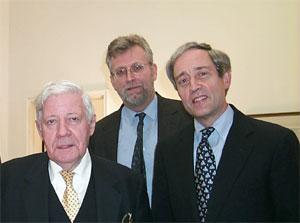
|
Former German Chancellor, Helmut Schmidt, left, is joined by Columbia President George Rupp, right, and Professor Mark Von Hagen, director of the Harriman Institute, before Schmidt's lecture at Columbia on Europe in the 21st Century
|
Helmut Schmidt, the German Chancellor from 1974 to 1982, believes the European nations will be guided toward closer ties by the lure of prosperity but will never become so integrated as to function politically like a single nation.
Schmidt predicts Europe will become a federation with ever more close cooperation on economic matters -- perhaps installing a controlling authority over a united treasury. Speaking to an audience of 400 scholars, diplomats and other invited guests at Columbia on Monday evening, Schmidt said despite a common currency and new ties through the European Union, the cooperation will never erase the independent political soul of each nation-member.
"Europe will never become one nation -- certainly not," he said. "Even if we have something close to government cooperation, no, the unique national will of each member, its government, culture, language, will remain."
Schmidt delivered the eighth annual W. Averell Harriman Lecture, sponsored by the Harriman Institute at Columbia's School of International and Public Affairs.
Schmidt, a Social Democrat who was among the founders of the Economic Summit of the major Western powers held for the first time in 1975, said the 50 member-nations of the European Union would create an economic powerhouse over the next 20 years but "it remains to be seen" whether it would also become a major political force. "It is very unlikely to become a military power," he said. The move to peacefully unify many distinct sovereign nations, he noted, was unprecedented through history. How the union fares, he added, would depend on whether leaders can provide the necessary "farsighted leadership" in times of crisis. His own view was not upbeat. "Far-sighted leadership right now," he said, "is not in over-abundant supply." In his speech Schmidt outlined several "probabilities" for the coming century, including:
-
Most of Europe will exist peacefully, although countries east of Poland might see continued armed conflict
-
the best "foreseeable outcome" for the Balkans will be the establishment of five or six protectorates under the control of the West -- two in Bosnia, one in Kosovo and one each "defacto protectorates" in Albania and Macedonia.
-
Turkey is unlikely to be invited to join the European Union
-
Europe will be moved to seek wider cooperation with Islamic-led nations
-
Up to five world powers may be in place; likely to join the United States are Russia, China, Japan and Europe
-
The United States will likely seek wider cooperation with Russia and China.
Schmidt, 81, was the guest of honor at a dinner following the lecture, hosted by the Harriman Institute, the oldest academic center in the United States devoted to the interdisciplinary study of the Russian Empire, the Soviet Union and the post-Communist states. Founded in 1946 as the Russian Institute, the name was changed in 1982 in gratitude for a generous endowment from the late Governor W. Averell Harriman and his wife, the late Ambassador Pamela Harriman.
|
